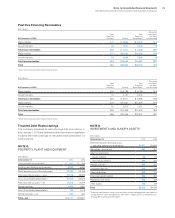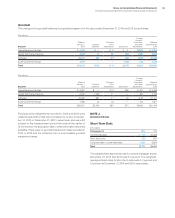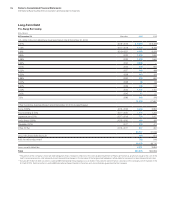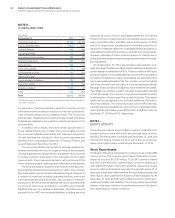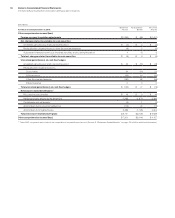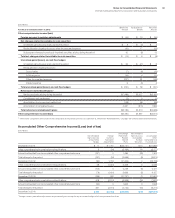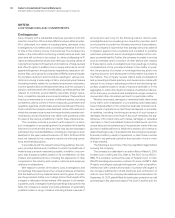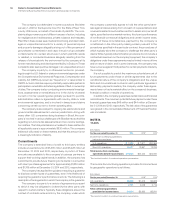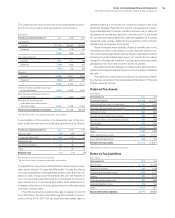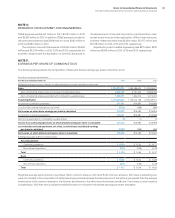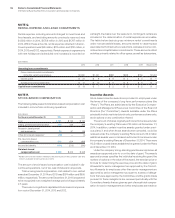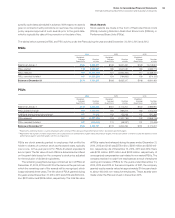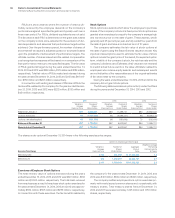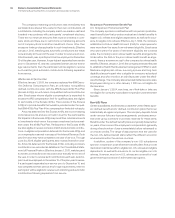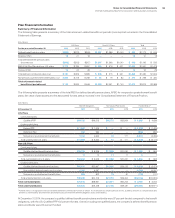IBM 2014 Annual Report Download - page 124
Download and view the complete annual report
Please find page 124 of the 2014 IBM annual report below. You can navigate through the pages in the report by either clicking on the pages listed below, or by using the keyword search tool below to find specific information within the annual report.Notes to Consolidated Financial Statements
International Business Machines Corporation and Subsidiary Companies
123
SCO Group, Inc. v. Novell, Inc., held a trial in March 2010. The jury
found that Novell is the owner of UNIX and UnixWare copyrights;
the judge subsequently ruled that SCO is obligated to recognize
Novell’s waiver of SCO’s claims against IBM and Sequent for
breach of UNIX license agreements. On August 30, 2011, the Tenth
Circuit Court of Appeals affirmed the district court’s ruling and
denied SCO’s appeal of this matter. In June 2013, the Federal Court
in Utah granted SCO’s motion to reopen the SCO v. IBM case, and
proceedings have resumed in that case.
On May 13, 2010, IBM and the State of Indiana (acting on behalf
of the Indiana Family and Social Services Administration) sued one
another in a dispute over a 2006 contract regarding the modern-
ization of social service program processing in Indiana. The State
terminated the contract, claiming that IBM was in breach, and
the State is seeking damages. IBM believes the State’s claims
against it are without merit and is seeking payment of termina-
tion amounts specified in the contract. After six weeks of trial, on
July18, 2012, the Indiana Superior Court in Marion County rejected
the State’s claims in their entirety and awarded IBM $52 million
plus interest and costs. On February 13, 2014, the Indiana Court
of Appeals reversed portions of the trial judge’s findings, found
IBM in material breach, and ordered the case remanded to the
trial judge to determine the State’s damages, if any. The Indiana
Court of Appeals also affirmed approximately $50 million of the
trial court’s award of damages to IBM. This matter remains pend-
ing in the Indiana courts.
On April 16, 2014, Iusacell SA de C.V. (Iusacell) sued IBM, claim-
ing that IBM made fraudulent misrepresentations that induced
Iusacell to enter into an agreement with IBM Mexico. Iusacell claims
damages for lost profits. Iusacell’s complaint relates to a contrac-
tual dispute in Mexico, which is the subject of a pending arbitration
proceeding in Mexico initiated by IBM Mexico against Iusacell for
breach of the underlying agreement. On November 14, 2014, the
District Court in the Southern District of New York granted IBM’s
motion to stay Iusacell’s action against the company pending the
arbitration in Mexico between Iusacell and IBM Mexico.
IBM United Kingdom Limited (IBM UK) initiated legal proceed-
ings in May 2010 before the High Court in London against the
IBM UK Pensions Trust (the UK Trust) and two representative
beneficiaries of the UK Trust membership. IBM UK is seeking a
declaration that it acted lawfully both in notifying the Trustee of the
UK Trust that it was closing its UK defined benefit plans to future
accruals for most participants and in implementing the company’s
new retirement policy. In April 2014, the High Court acknowledged
that the changes made to its UK defined benefit plans were within
IBM’s discretion, but ruled that IBM breached its implied duty of
good faith both in implementing these changes and in the manner
in which it consulted with employees. Proceedings to determine
remedies were held in July 2014 and in February 2015 the High
Court held that for IBM to make changes to accruals under the
plan would require a new consultation of the participants, but to
make other changes (including to early retirement policy) would
not require such consultation. IBM intends to appeal both the
breach and remedies judgments. In addition, IBM UK is a defen-
dant in approximately 290 individual actions brought since early
2010 by participants of the defined benefits plans who left IBM
UK. These actions, which allege constructive dismissal and age
discrimination, are pending before the Employment Tribunal in
Southampton UK.
In a separate but related proceeding, in October 2012, the
High Court held that the 1983 Trust Deeds and Rules should be
modified to allow certain categories of current IBM UK employ-
ees who are members of the C Plan to retire from the age of 60
(rather than from the age of 63) without actuarial reduction of their
defined benefit pension. In a supplementary ruling in December
2012, the Court declined to similarly modify the Trust Deeds and
Rules for former employees who were C Plan members and who
left the company prior to retirement. Neither party appealed these
judgments. As a result of the October 2012 ruling, IBM recorded
a pre-tax retirement-related obligation of $162 million in the third
quarter of 2012.
On March 24, 2014, in a suit brought by local Works Councils,
the Supreme Court of Spain held that IBM Spain’s Defined Contri-
bution (DC) Plan implemented in 1993 was null and void, and held
that current employees could reinstate their rights to a Defined
Benefit (DB) Plan, although with an offset for DC contributions paid
to date. The Court held that IBM Spain did not consult with the
Works Councils in seeking the voluntary participation of employ-
ees in changing the pension scheme, and recommended that IBM
Spain and the Works Councils engage in discussions over how to
carry out the offset. The ruling is declaratory only. IBM Spain has
requested leave to appeal the decision to the Constitutional Court.
The matter remains pending in the Spanish courts.
In March 2011, the company announced that it had agreed to
settle a civil enforcement action with the Securities and Exchange
Commission (SEC) relating to alleged violations of the Foreign Cor-
rupt Practices Act of 1977. On July 25, 2013, the court approved
that 2011 settlement and required that for a two-year period IBM
make reports to the SEC and the court on certain matters, includ-
ing those relating to compliance with the FCPA. In early 2012, IBM
notified the SEC of an investigation by the Polish Central Anti-Cor-
ruption Bureau involving allegations of illegal activity by a former
IBM Poland employee in connection with sales to the Polish gov-
ernment. IBM is cooperating with the SEC and Polish authorities in
this matter. In April 2013, IBM learned that the U.S. Department of
Justice (DOJ) is also investigating allegations related to the Poland
matter, as well as allegations relating to transactions in Argentina,
Bangladesh and Ukraine. The DOJ is also seeking information
regarding the company’s global FCPA compliance program and
its public sector business. The company is cooperating with the
DOJ in this matter.


